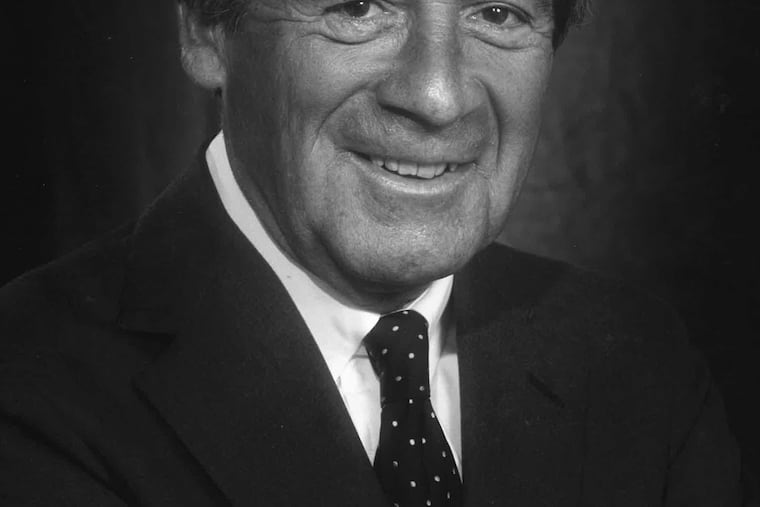John R. Bunting Jr., a former Philadelphia bank executive and civic leader, dies at 94
As chairman and CEO of First Pennsylvania Bank, Mr. Bunting made moves that paved the way for today’s streamlined nationwide banking industry.

John R. Bunting Jr., 94, of Jenkintown, a former Philadelphia bank executive and civic leader, died Thursday, Jan. 30, of dementia at Rydal Park.
In 1964, after a stint at the Federal Reserve Bank of Philadelphia, he joined First Pennsylvania Bank, becoming chairman and CEO.
Al Lord, the retired CEO of Sallie Mae, the student loan lender, knew Mr. Bunting in the 1970s when both worked for First Pennsylvania Corp. (FPC), the parent company of First Pennsylvania Bank. Mr. Bunting was CEO; Lord was the financial manager of non-bank assets.
In the banking world, FPC was an exciting outlier, Lord said. By 1973, Mr. Bunting had capitalized on changes in banking rules to transform First Pennsylvania from a sedate regional bank into a national financial institution, before such expansion was the norm.
Between 1967 and 1974, he tripled the size of First Pennsylvania to $6 billion, wrote Eugene N. White in his 1992 book, The Comptroller and the Transformation of American Banking, 1960 to 1990. To support the rapid growth, the bank made high-risk loans, gambling that interest rates would fall.
Mr. Bunting acquired mortgage banking and consumer finance companies from Puerto Rico to California. He acquired a majority interest in a successful Israeli bank. Those acquisitions boosted FPC’s earnings.
So admired were Mr. Bunting and FPC that the company was named employer of choice by the Harvard Business School’s Class of 1973. “He made FPC a fine financial institution with diverse earnings sources,” Lord said.
But interest rates didn’t fall. There was pushback, too, from regulators at the Federal Reserve, the FDIC, and the federal Comptroller of the Currency opposed to the moves of what they saw as maverick bankers.
“I admired his behavior under pressure,” Lord said. “It was no fun to deliver the increasingly bad news to him. He had few very close advisers. Virtually all his subordinates deserted him.”
After interest rates soared in 1979, FPC was about to fail. On July 23, under pressure from regulators and the bank’s board of directors, Mr. Bunting resigned. The federal government bailed out the bank in 1980, the first such bailout of a national bank by federal authorities.
At the time of Mr. Bunting’s departure, First Pennsylvania was the city’s largest commercial bank and the nation’s 20th largest, The Inquirer reported.
“Now, nearly 50 years later, Mr. Bunting has passed on,” Lord said. “Largely forgotten are the advances he authored that began today’s streamlined nationwide banking industry. John Bunting was highly influential because he thought large, very large.”
Born and raised in Tacony, Mr. Bunting graduated from the Hill School in Pottstown before serving in the Army for two years during World War II. After the war, he married Jane Anne Shuttleworth. They had two children.
Mr. Bunting earned a bachelor’s degree in business and a master’s degree in economics from Temple University. He was an economics instructor at Temple and a visiting finance professor at St. Joseph’s University. He spoke at banking and business conferences.
As Mr. Bunting’s star rose in banking (he was named 1971 Banker of the Year by Finance Magazine), he became active in civic affairs. He was the head of a consortium of 10 banks that lent short-term money to the Philadelphia School District and chairman of the Philadelphia Bicentennial Corp. and the Delaware River Port Authority.
“You can’t live in the 1970s and be part of the future unless you are a leader in the area of social responsibility,” he told the Daily News in 1972.
“Hollywood handsome and a master economist, it was his calm and warm personality, with a wry sense of humor, that gave him the gravitas in the Philadelphia region to be an effective leader of his time,” Richard Maloney, a retired KYW news reporter, said in an email.
Mr. Bunting authored the 1964 book The Hidden Face of Free Enterprise published by McGraw Hill. He wrote many articles for business publications.
He was a member of the Atlantic City and Huntingdon Valley Country Clubs. He and his family spent summers in Ocean City. He enjoyed jogging, swimming, golfing, entertaining, and relaxing with family. He was a Temple sports fan and followed the city’s sports teams.
Along with his wife, Jane, he is survived by a daughter, Robin Corcoran; a son, John III; five grandchildren; and eight great-grandchildren.
A visitation starting at 10 a.m. Saturday, Feb. 8, at Grace Presbyterian Church, 444 York Rd., Jenkintown, will be followed by an 11 a.m. memorial service. Interment is private.